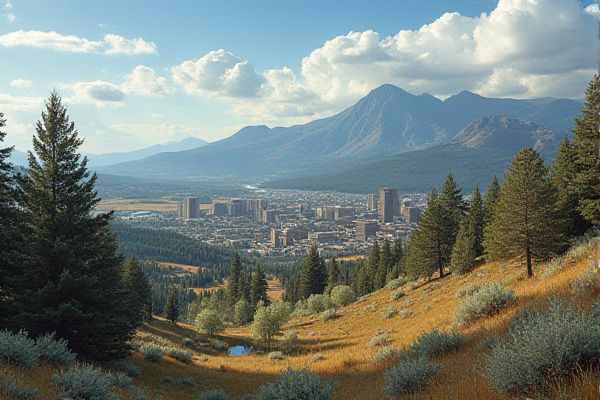
Local laws and regulations in Montana: Montana property tax regulations. Hunting and fishing licenses. Open container laws. Minimum wage requirements. Vehicle registration rules. Marijuana legalization regulations. Building permit requirements. Landlord-tenant law basics. Water rights laws. Firearm possession restrictions.
Montana property tax regulations
In Montana, property taxes are regulated by the state and local governments, with the Montana Department of Revenue responsible for appraising property values every two years. The taxes are calculated based on market value, taxable percent, and mill levies, with various exemptions available, and are primarily used to fund local services such as schools, roads, and infrastructure. For more detailed information, you can refer to the official Montana Department of Revenue documentation on property taxation policies.
Hunting and fishing licenses
To fish or hunt in Montana, most individuals need to purchase at least two licenses: a Conservation License and a Fishing or Hunting License. Additionally, an Angler Aquatic Invasive Species Prevention Pass is required for fishing. Resident status is determined by living in Montana for at least 180 consecutive days, filing state income tax returns, registering vehicles, and being registered to vote in the state. For more detailed information on the necessary licenses and regulations, visit the Montana Fish, Wildlife & Parks website.
Open container laws
In Montana, drivers are prohibited from possessing open containers of alcohol, ensuring safety and compliance on the roads. However, passengers are granted more leniency and can have open containers in specific vehicles such as campers, party buses, or limousines. Interestingly, open containers are also permitted in certain public areas during specific events, highlighting the state's flexibility in certain situations. It's important to note that violations of these rules could result in fines of up to $100. For more detailed information on these regulations, you can visit the Montana's Open Container Laws page. Such laws help in maintaining order and ensure responsible consumption of alcohol within the state.
Minimum wage requirements
As of January 1, 2024, the minimum wage in Montana is set at $10.30 per hour. This rate is adjusted annually based on the Consumer Price Index, ensuring fair compensation reflective of economic conditions. Notably, certain exceptions apply for businesses not covered by the Fair Labor Standards Act and whose gross annual sales are $110,000 or less; these businesses are allowed to pay a lower rate of $4.00 per hour. For more detailed information on this adjustment, you can visit the Montana Budget and Policy Center website to better understand the implications and regulations surrounding this change.
Vehicle registration rules
In Montana, all motor vehicles, including motorcycles, trailers, and watercraft, must be registered within 60 days of establishing residency. Registration options include 12-month, 24-month, and permanent registration for eligible vehicles, with fees based on the vehicle's age and type. To learn more about the registration process and requirements, visit the Montana Vehicle Registration website for detailed information and guidance.
Marijuana legalization regulations
In Montana, recreational and medical marijuana use has been legal since January 1, 2021, under Initiative 190, allowing adults 21 and older to possess up to one ounce of marijuana. Recreational sales began on January 1, 2022, in counties that approved the initiative, with a 20% tax on sales, and local jurisdictions can prohibit dispensaries through a public vote. For more detailed information, visit the Cannabis in Montana page.
Building permit requirements
In Montana, a state building permit is required for non-exempt buildings, including new constructions, alterations, additions, and changes of occupancy, with exemptions for certain types like farm and ranch buildings, and private garages and storage buildings. The permit process involves submitting construction plans and a Building Permit/Plan Review Application for review and approval before starting any work.
Landlord-tenant law basics
In Montana, landlord-tenant laws are governed by the Residential Landlord and Tenant Act, which requires written rental agreements, limits certain lease terms, and mandates reasonable notice for entry and specific notice periods for evictions. Landlords must maintain habitable premises, and tenants have rights to reasonable accommodations and protections against housing discrimination. For more detailed information on these regulations, you can visit the Montana Tenant Landlord Law resource.
Water rights laws
Montana water law is shaped by the "First In Time, First In Right" doctrine, which prioritizes water rights based on the date of initial use. Residents of Montana do not own the water but are granted a legal right to its use, provided they adhere to state regulations. To ensure these rights are valid and defensible against other users, it is necessary to have a recorded water right for most uses. For more detailed information, the Montana Department of Natural Resources and Conservation offers comprehensive resources on water rights and regulations.
Firearm possession restrictions
In Montana, firearm possession is restricted for individuals convicted of certain felonies, those subject to specific court orders related to domestic violence or mental health, and those required to register for the sexual or violent offender registry. However, Montana law allows otherwise ineligible individuals to possess firearms if they receive a permit from their local court. It does not have state-level restrictions such as universal background checks, gun owner licensing, or magazine capacity limits. For more information, visit the full article on Gun Laws in Montana.
